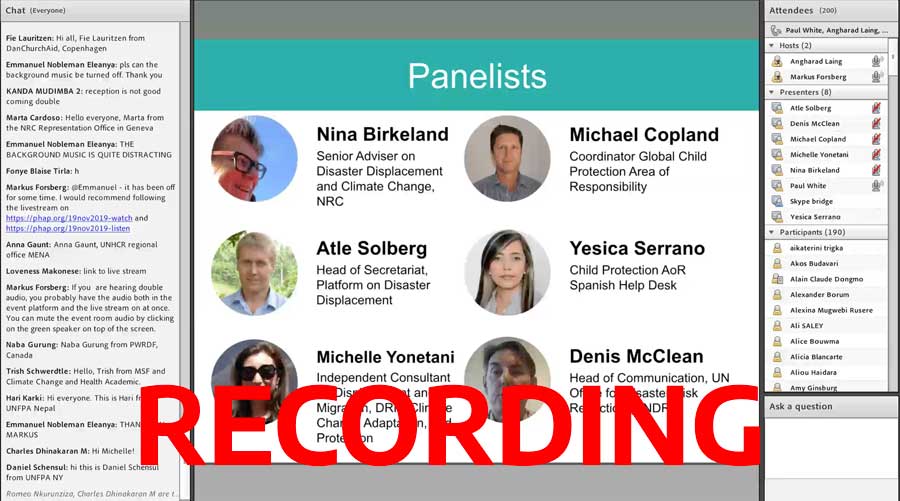
Recording available: What is the role of the Global Protection Cluster in strengthening protection in response to climate change-related disasters?
On 19 November, PHAP together with the Global Protection Cluster (GPC) organized a webinar as part of a series of events organized to gather the views of practitioners globally to help shape and refine the GPC’s new Strategic Framework for 2020-2024. With over 400 attendees taking part during this live session, the discussion covered how protection concerns can be better included in preparedness work and in slow-onset disasters to avoid protection gaps, as well as the GPC’s potential role in this area.
To help inform the discussions and allow for practitioners to provide their input on this topic to the GPC’s Strategic Framework, PHAP and GPC organized a pre-event survey where event registrants were asked about their views on how climate change was affecting protection concerns.
Taking on the form of an expert panel discussion with active participation from attendees via chat, Q&A, and live polls during the event, attendees heard from Denis McClean, Head of Communication, UN Office for Disaster Risk Reduction (UNDRR), who briefed participants on how changing climate affects disaster response in terms of type, severity, and quantity of disasters.
Atle Solberg, Head of Secretariat, Platform on Disaster Displacement, focused on three points in his remarks: How humanitarian protection of displaced people is affected by climate change; how slow-set disasters undermine resilience; and the lack of disaggregated data on the protection needs of those displaced. Michelle Yonetani, Independent Consultant on Displacement and Migration, DRR, Climate Change Adaptation, and Protection, also highlighted issues related to data and information, mentioning, in particular, the issue of increasing unpredictability for humanitarian actors and affected communities, and an increasing need for access to information.
Nina Birkeland, Senior Adviser on Disaster Displacement and Climate Change with the Norwegian Refugee Council (NRC), pointed to the gaps in humanitarian protection in terms of how preparedness work is carried out, emphasizing the rise of disaster displacement in the past decade. Michael Copland, Coordinator Global Child Protection Area of Responsibility, also mentioned coordination gaps between different clusters in combating protection concerns due to climate change and disasters. He was also joined by Yesica Serrano, Child Protection AoR Spanish Help Desk, who provided an overview of their work supporting the implementation of preparedness initiatives in Colombia.
If you missed the event, video recordings and an audio podcast version of the event are now available on the event page.
Access recordings
Access recommended resources